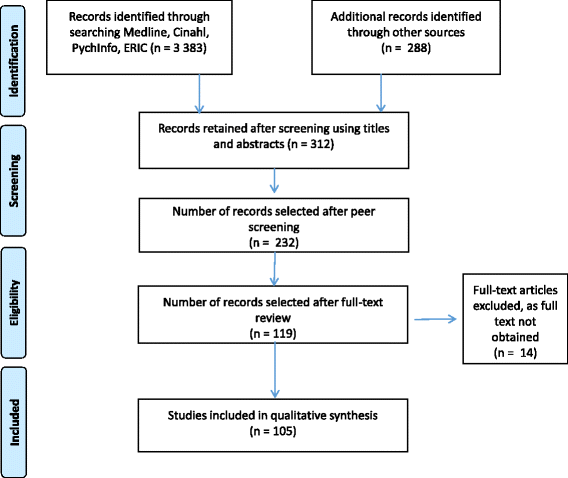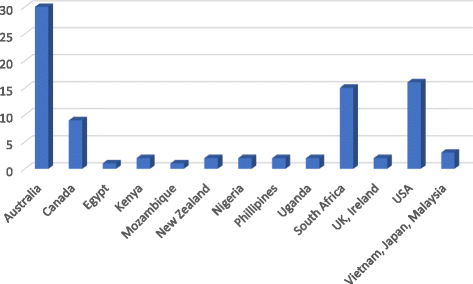Decentralised training for medical students: a scoping review
- PMID: 29121923
- PMCID: PMC5680751
- DOI: 10.1186/s12909-017-1050-9
Decentralised training for medical students: a scoping review
Abstract
Background: Increasingly, medical students are trained at sites away from the tertiary academic health centre. A growing body of literature identifies the benefits of decentralised clinical training for students, the health services and the community. A scoping review was done to identify approaches to decentralised training, how these have been implemented and what the outcomes of these approaches have been in an effort to provide a knowledge base towards developing a model for decentralised training for undergraduate medical students in lower and middle-income countries (LMICs).
Methods: Using a comprehensive search strategy, the following databases were searched, namely EBSCO Host, ERIC, HRH Global Resources, Index Medicus, MEDLINE and WHO Repository, generating 3383 references. The review team identified 288 key additional records from other sources. Using prespecified eligibility criteria, the publications were screened through several rounds. Variables for the data-charting process were developed, and the data were entered into a custom-made online Smartsheet database. The data were analysed qualitatively and quantitatively.
Results: One hundred and five articles were included. Terminology most commonly used to describe decentralised training included 'rural', 'community based' and 'longitudinal rural'. The publications largely originated from Australia, the United States of America (USA), Canada and South Africa. Fifty-five percent described decentralised training rotations for periods of more than six months. Thematic analysis of the literature on practice in decentralised medical training identified four themes, each with a number of subthemes. These themes were student learning, the training environment, the role of the community, and leadership and governance.
Conclusions: Evident from our findings are the multiplicity and interconnectedness of factors that characterise approaches to decentralised training. The student experience is nested within a particular context that is framed by the leadership and governance that direct it, and the site and the community in which the training is happening. Each decentralised site is seen to have its own dynamic that may foreground certain elements, responding differently to enabling student learning and influencing the student experience. The insights that have been established through this review have relevance in informing the further expansion of decentralised clinical training, including in LMIC contexts.
Keywords: Decentralised training; Distributed; Medical student; Rural; Undergraduate.
Conflict of interest statement
Authors’ information
MdV (PhD) is Professor in Family Medicine and Primary Care at Stellenbosch University (SU). She served as Deputy Dean: Education at the Faculty of Medicine and Health Sciences (FMHS) for 10 years and is currently the Principal Investigator for SUCCEED. SvS (PhD) is currently the Director: Centre for Health Professions Education at the FMHS, SU. JB (FCFP(SA)) is currently the Vice-Dean: Learning and Teaching at the FMHS, SU. IC (FCFP(SA)) is the current Director: Ukwanda Centre for Rural Health at SU and Professor of Rural Health: Centre for Health Professions Education, SU. KM (FCPHM(SA)) was the Project Manager, SUCCEED, and currently serves as consultant. ZT (FACP(US)) is Associate Professor at George Washington University, Washington DC, USA, and serves as consultant to SUCCEED. TY (PhD) is Director: Centre for Evidence-based Health Care at the FMHS, SU, and Activity Manager: Operational Research in SUCCEED. SUCCEED aims to improve the quality of HIV/AIDS and related services through capacity development and technical assistance in decentralised learning, operational research, and quality improvement and data quality.
Ethics approval and consent to participate
Ethics approval was obtained from the Stellenbosch University Human Research Ethics Committee, approval number #N16/03/034.
Consent for publication
Not applicable
Competing interests
The authors declare that they have no competing interests.
Publisher’s Note
Springer Nature remains neutral with regard to jurisdictional claims in published maps and institutional affiliations.
Figures
References
-
- Van Schalkwyk SC, Bezuidenhout J, Conradie HH, Fish T, Kok NJ, Van Heerden BH, de Villiers MR. Going rural': driving change through a rural medical education innovation. Rural Remote Health. 2014;14:2493. - PubMed
-
- Wilson N, Couper I, De Vries E, Reid S, Fish T, Marais B. Inequitable distribution of healthcare professionals to rural and remote areas. Rural Remote Health. 2009;9:1060. - PubMed
Publication types
MeSH terms
Grants and funding
LinkOut - more resources
Full Text Sources
Other Literature Sources



